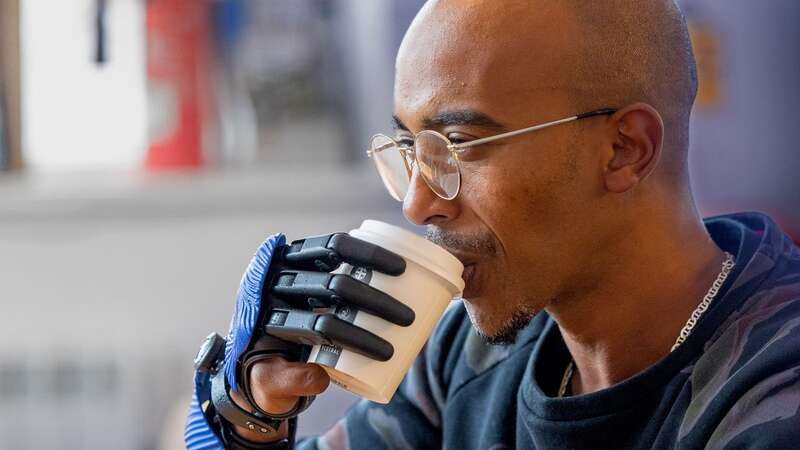An amputee who lost his fingers in a meat grinder has been given a new lease of life after being fitted out with new 3D-printed prosthetic digits.
Mo Ali, 40, a freelance multimedia designer, lost four fingers from his right hand at the age of six after playing around in the kitchen. And he was bullied throughout his childhood for his limb difference, which forced him to feel like he had to hide it. But now he's able to cycle and dress himself more easily with his new bionic fingers - and says it's given him an instant confidence boost.
Mo, from Brighton, said: "I coped with my disability by simply hiding it... now, I'm able to walk down the road without feeling the need to hide." Before being able to use the 3D fingers, Mo tried a prosthetic hook prescribed by the NHS. But says it felt heavy and uncomfortable and didn't give him the dexterity he needed.
The keen cyclist also used to stuff a biking glove with tissue, leaving him unable to get a proper grip on things like handlebars. He added: "I love bikes. Cycling, motorbikes, everything to do with bikes. In the past, I used to use a bike glove, stuff it with tissue and grip it around the handlebars so I could have better control of steering. Now with the Hero Gauntlet, once I have a grip on something, I know it's not going anywhere."
Mo has explored different prosthetic options for the last 15 years, but he didn't feel suited to them. He added: "I was prescribed a prosthetic hook on the NHS. It was operated by my shoulder to open and close. It was so heavy and uncomfortable - and it got in the way. I stopped using it after a day."
 Hospitals run out of oxygen and mortuaries full amid NHS chaos
Hospitals run out of oxygen and mortuaries full amid NHS chaos
Mo's new fingers were commissioned by British robotics company OpenBionics using 3D printing technology. The space-age, active partial hand prosthetic is custom-made for each user using 3D scanning, printing and modelling technology. It enables those born without fingers or those who've undergone partial hand amputation to regain their hand functionality. The firm is hoping it will be made available to other people with limb differences on the NHS.
Co-founder Samantha Payne said: "We've had so many requests from the limb difference community to design and develop a partial hand solution that offers function and comfort for all day wear. It's pure joy to see this piece of engineering have a positive physical and emotional impact on Mo's life."
Read more similar news:
Comments:
comments powered by Disqus


































